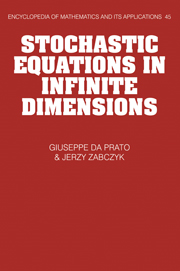Introduction: Motivating examples
Published online by Cambridge University Press: 21 March 2010
Summary
As we have said in the Preface, stochastic evolution equations in infinite dimensions are natural generalizations of stochastic ordinary differential equations and their theory has motivations coming both from mathematics and the natural sciences: physics, chemistry and biology.
We present here several examples of stochastic equations of the form (0.1), together with some comments concerning their derivations. Examples 0.1 - 0.3 have purely mathematical motivations, Examples 0.4 - 0.6 come from physics, Example 0.7 from chemistry and 0.8 - 0.9 from biology.
Lifts of diffusion processes
Consider an ordinary stochastic differential equation on Rd of the form
where f and b1, …,bN are continuous mappings from Rd into Rd. Let us fix a closed subset K ⊂ Rd and let E be a Hilbert space of mappings from K into Rd contained in the space C(K;Rd) of continuous mappings from K into Rd. The following equation on E:
in which
is called the lift of (0.2) to E.
Note that if the identity mapping Id(ξ) : Id(ξ) = ξ ∈ K belongs to E and there exists a solution to (0.3) with x = Id then the formula:
defines a version of the solution to (0.2) continuously depending on the initial condition ξ. Such versions are called stochastic flows. If in addition the space E consists of diffeomorphisms then the stochastic flow (0.4) is the flow of diffeomorphisms. This way one can obtain basic results about stochastic flows from elementary facts on stochastic equations with values in infinite dimensional spaces and known results about Sobolev spaces. See [37] for a detailed exposition of the subject.
Information
- Type
- Chapter
- Information
- Stochastic Equations in Infinite Dimensions , pp. 1 - 12Publisher: Cambridge University PressPrint publication year: 1992
